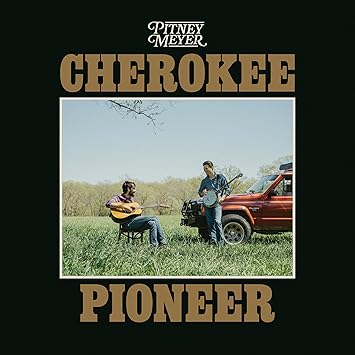Album Review – Pitney Meyer’s “Cherokee Pioneer”

Bluegrass (#520) on the Country DDS.
Under a different set of fates and circumstances, it could have been Mo Pitney revolutionizing popular country music with a neotraditional sound like we’re seeing from Zach Top and others in this moment. A strong argument could be made that it probably should have been Mo. When he started releasing singles for Curb Records in 2014, it was hard for true country fans to contain their excitement. Was this the artist we’d been waiting for who could help save country music?
Perhaps Mo Pitney was just too ahead of his time, just like William Michael Morgan and others who debuted during the height of Bro-Country, and had an impossible uphill battle to wage. It probably didn’t help that Mo’s label Curb Records can be one of the worst for enacting the “Artist Protection Program” for performers—meaning signing them to restrictive deals, and then mismanaging their careers by putting them on five year album release cycles.
However we got to this moment, Mo Pitney has now partnered with banjo player and songwriter John Meyer, who’s known in certain bluegrass circles for playing in a family band a fronting bands of his own. Together they offer up a straightforward bluegrass album under the duo name Pitney Meyer that warms your cockles, and does for bluegrass what Mo did for traditional country previously: make you hopeful for the future.
In eleven original songs and a cover of John Anderson’s “Seminole Wind,” Mo Pitney and John Meyer remind you why you love bluegrass so much. There’s no dearth of bluegrass acts or bluegrass albums, and it seems everyone is trying to figure out how to put their unique spin on this very old genre. But nothing replaces bringing a true love and youthful enthusiasm to the music, and letting the joy of bluegrass express itself. This is what Pitney Meyer accomplish on Cherokee Pioneer.
The chemistry of this album is significantly to blame for the positive outcome. Mo Pitney and John Meyer approached this album like a brotherhood, hatched it in jam sessions together with no ultimate goal to begin with other than enjoying the music, and then went into the recording wanting to capture the live, human element as much as possible. This included setting up a completely analog studio in the 1837 hand-hewn log cabin previously owned by Johnny Cash in Bon Aqua, Tennessee.

Recorded live over three days, Mo and John also solicited the services of Nate Burie on mandolin, Blake Pitney on bass, along with Ivy Phillips and the award-winning Jennee Fleenor on fiddle. The pickin’ on the album is great, but this isn’t exactly a pickin’ bluegrass album. It’s the harmonies that draw you in, and the songwriting that separates it from other standard bluegrass projects.
Whether it’s original songs that sound like classic bluegrass standards such as “Banjo Picker” or “Blue Creek Clay,” or tracks where the writing really stuns you like “White Corn Graves” and “Blue Water,” this is bluegrass that is meant to move you deeper than the twitch the mandolin chuck or banjo roll puts in your bones. Mo and John separate themselves from the bluegrass herd with the writing on this one.
And this is bluegrass with a message. Country music has always shared a close kinship and concern for America’s Native American population, and this is expressed not just in the bluegrass interpretation of “Seminole Wind,” but in the original song “Trail of Tears.” Those who’ve followed along with Mo Pitney over the years know how important his faith is to him. John Meyer happens to share these feelings, and it’s expressed in this album, especially in the final three songs.
Though Mo Pitney became known through country, just like so many country greats of the past, he was raised on bluegrass. Is that where he will eventually end up and make his mark in this great partnership with John Meyer? Time will tell. But with his country career stalled and Curb Records clueless what to do with him, why not try something different? Cherokee Pioneer doesn’t have a lot that’s different or unique to the bluegrass discipline. But sometimes it’s the bluegrass that’s original in scope but feels immediately familiar that’s the best.
8.1/10
– – – – – – – –
Purchase from Pitney Meyer
Purchase on Amazon


August 4, 2025 @ 8:08 am
It is so frustrating when major labels don’t know what do with immensely talented artists. There is such a long list of artists who either never got a legitimate chance like Mo Pitney or had their run but it ended way sooner than it needed to (Josh Turner, David Nail). Obviously Turner is still on MCA Nashville, but for him to not get any radio play with that voice is so absurd. Let’s waste time on talentless hack 1, 2, 3, and 4 when we could be promoting real talent. Nashville Logic at its finest.
All that being said, I’m so excited to hear this.
August 4, 2025 @ 8:13 am
OMG FINALLY. I’ve been wondering if we’ll ever hear from Mo again.
August 4, 2025 @ 8:59 am
Very nice album, gotta agree wholeheartedly with this!”‘But nothing replaces bringing a true love and youthful enthusiasm to the music, and letting the joy of bluegrass express itself. This is what Pitney Meyer accomplish on Cherokee Pioneer.”
August 4, 2025 @ 9:09 am
The power of the Earl Scruggs style driving, lead banjo in your face, paired with superb singing. This is the secret sauce. Also, something about these duo acts that are compelling, like Rob Ickes and Trey Hensley , for example, that tend to do well in the trad- grass world. Gibson Brothers is another example. And of course Dailey and Vincent. There is no reason these two shouldn’t find success within the traditional bluegrass festival circuit.
They are tailer made to be a potential up and coming headliner act. I would hopefully expect to find these guys on the big Grass stages next year. Good on Mo Pitney, for going for it. Hes got all the vocal chops you could ever want. Great singing is always gonna triumph over mediocre vocals in Americana music. Pitney has that authenticity that others chase after, though never quite pulling it off.
August 4, 2025 @ 9:55 am
there’s so much great stuff on Youtube of Mo, bluegrass and original classic sounding counry (sorry to his partner here, we are all happy for both of you on this album but Mo made a big splash and then almost disappeared a while back).
Man! it’s great you mentioned Trey Hensley and Rob Ickes. I had MY FACE MELTED OFF seeing them play a bluegrass festival in California a month or two ago. HOLY MOLEY. If you get a chance to see two people shred on acoustic instruments, go see those two. They do blues on bluegrass instruments on some of their albums, too.
August 4, 2025 @ 10:11 am
FYI, Rob Ickes and Trey Hensely recently announced they are going their separate ways amicably. Trey is going to focus on a solo career, and Rob is going to focus more on studio work.
August 4, 2025 @ 10:45 am
Yeah, I read about that. I guess Rob is tired of the road grind. Can’t blame him, he did it for a long time with Blue Highway.
A shame though, he and Hensley have really built something.
August 4, 2025 @ 10:39 am
I love records that are cut quickly and honestly like this. It sounds great!
August 4, 2025 @ 11:41 am
Like a strip of pine curl from a plane. Sounds good!
August 4, 2025 @ 12:57 pm
Trigger, thanks for sharing this. Hopefully it’s a successful venture. I remember listening to an interview with Bela Fleck a couple years ago and he was asked for advice to the next generation about how they could move the music forward. He said his generation had already played it as fast and complicated as you can so maybe the next generation should differentiate themselves through lyrics and vocals. Now somewhere out there there is a young super picker who took that as a challenge…but this is a good example of someone successfully taking that road.
August 4, 2025 @ 2:46 pm
They’ll be as successful in Bluegrass as they want to be. Unlike the country music industry, Bluegrass still recognizes and rewards talent and sincerity.
August 5, 2025 @ 2:44 am
This is a decent bluegrass album, but after watching Pitney’s appearances on the Country’s Family Reunion series, I would rather hear him do traditional country. His performance of Merle Haggard’s “Farmers Daughter” brings tears to my eyes every time I hear it. It is really a travesty that his label has done nothing to further his country career
August 5, 2025 @ 8:43 am
Mo (“Mo”?) doesn’t fall into a marketable type.
Morgan Wallen = baseball cap everyman drinking problem with potential.
Luke Combs = proof that talent can make it without looks.
Keith Whitley = doomed romantic beautiful alcoholic.
Jamey Johnson = Grizzly Adams now sober.
Randy Travis = your mom’s favorite evangelical shirt with a dark side.
Brad Paisley = college-educated wit and virtuoso.
Kenny Chesney = beach town Peter Pan with good heart.
Tim McGraw = male stripper who submitted to female improvement.
Garth Brooks = majored in business.
Alan Jackson = aspirational older brother.
Trace Adkins = aging good old boy, now older and wiser.
George Strait = the Dad we’ve always loved.
And so pm. So far, Mo is nice guy with guitar. He needs mo’ than that.
August 5, 2025 @ 11:45 am
Have always been a fan of Mo and was blessed to meet him and his family after a concert in Maine a couple years ago. While talking to him, Mo said he wanted to pray for us as we were embarking on a Western road trip. A few days later, we visited my brother who had cancer, and he suddenly passed away the next week. Always felt special about Mo praying for us…
Mo just seems to be the real deal. Doing what he loves, genuine, and as we like to say “comfortable in his own skin”-which means he does what he enjoys, no matter what he does or what others think.
Love this new album, he definitely has a voice for bluegrass! Like Josh Turner, a big talent that never got his big break but continues on being true to himself, his faith, and his family, and is making great music!